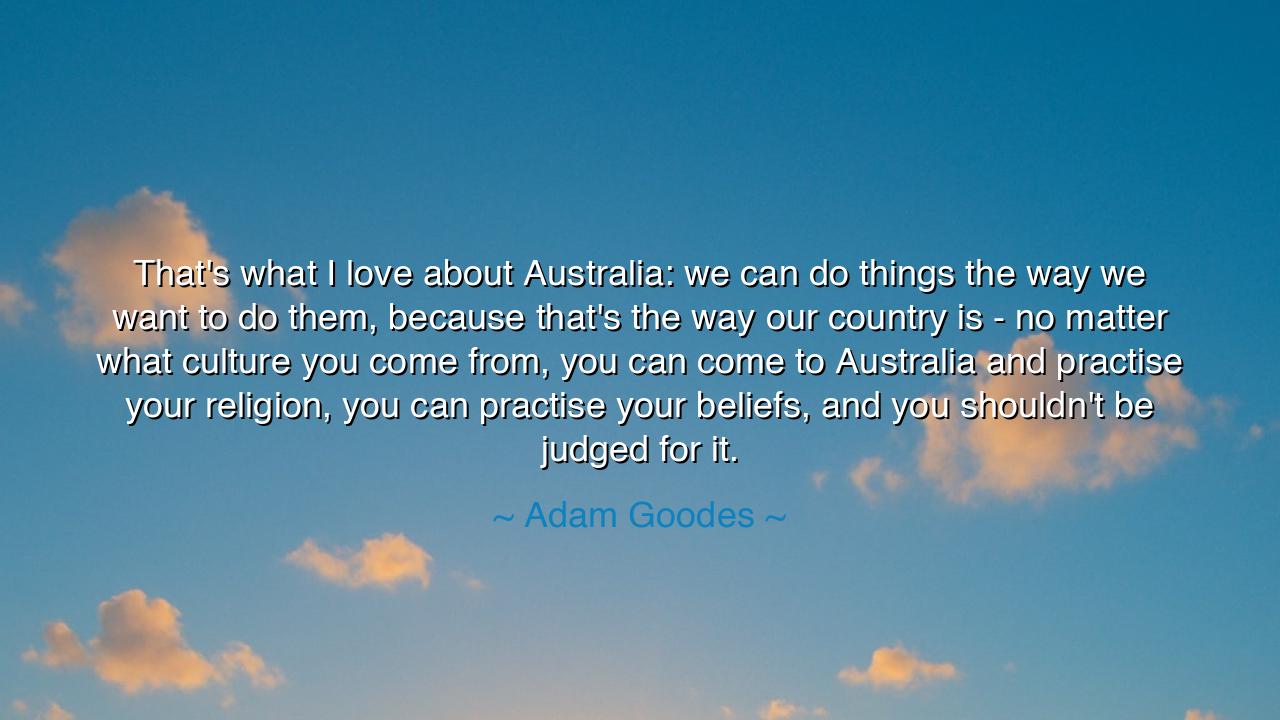
That's what I love about Australia: we can do things the way we
That's what I love about Australia: we can do things the way we want to do them, because that's the way our country is - no matter what culture you come from, you can come to Australia and practise your religion, you can practise your beliefs, and you shouldn't be judged for it.






"That's what I love about Australia: we can do things the way we want to do them, because that's the way our country is - no matter what culture you come from, you can come to Australia and practise your religion, you can practise your beliefs, and you shouldn't be judged for it." These words by Adam Goodes, a celebrated Australian Indigenous athlete and activist, capture the spirit of freedom and acceptance that underpins the essence of Australia. Goodes speaks to a vision of a society that not only celebrates diversity but also embraces the idea that everyone, no matter their cultural background or beliefs, should be able to live in harmony, free from judgment. His words resonate with the timeless principles of inclusion and mutual respect, where the individual is honored in their right to practice and express their faith without fear of discrimination.
This ideal aligns with the wisdom of the ancients, who, despite their often rigid societies, valued the importance of freedom and individual dignity. The Greek philosophers, for example, argued that the true purpose of society was to allow individuals to live in accordance with their nature and their moral beliefs. Socrates, in particular, valued freedom of thought and the right to question prevailing norms. He understood that without the freedom to explore different ideas and beliefs, society would remain stagnant and unfulfilled. Like Goodes, Socrates believed that true wisdom came from embracing a world where individuals were allowed to express themselves without the fear of being judged or marginalized for their differences.
In the life of Mahatma Gandhi, we see the profound impact of cultural acceptance and religious freedom. Gandhi’s struggle for Indian independence was not only a fight against British colonial rule but also against the rigid societal divisions imposed by religion and caste. He envisioned an India where all people, regardless of their faith or cultural background, could live together in peace and mutual respect. Gandhi’s nonviolent resistance was not merely a political tactic, but a call for a society based on respect for each person’s right to worship and live according to their own beliefs. His commitment to religious tolerance and cultural freedom mirrors Goodes’ vision of an Australia where individuals can practice their faiths without fear of persecution or discrimination.
Similarly, the United States, founded on the principles of freedom and religious liberty, was created as a sanctuary for those who sought to practice their beliefs without interference. The First Amendment of the U.S. Constitution enshrines the right of individuals to freely practice religion without government interference. This vision of freedom, inspired by the Enlightenment ideals of individual rights, was revolutionary in its time. The American Revolution, which sought to free the people from British tyranny, was not just a fight for political freedom but also for the freedom of conscience—the ability to believe as one chooses. Like Australia, the United States was conceived as a place where diverse beliefs could coexist, where people of all cultures could contribute to the greater good without fear of being oppressed for their differences.
In Australia, the recognition of Indigenous rights and the effort to embrace cultural diversity have been fraught with challenges. Yet, the idea that individuals should not be judged for their faith, culture, or background is an ideal that Goodes champions as an essential part of what it means to live in Australia. His work in anti-racism and social justice—especially in relation to Indigenous issues—has pushed Australians to confront the inequalities faced by Indigenous communities. In his eyes, Australia’s greatness lies not just in its natural beauty, but in its potential to become a true sanctuary of acceptance. He reminds us that freedom is not just about being able to live according to one's own cultural values, but about respecting the values of others, regardless of their background or traditions.
The lesson from Adam Goodes’ words is one of unity in diversity. In a world that is increasingly global and interconnected, we must seek to celebrate our differences rather than fear them. To create a society where people are free to practice their religion and beliefs without fear of discrimination is not only a moral imperative, but a recognition of the shared humanity that binds us all. Whether we are Indigenous or non-Indigenous, Christian, Muslim, Hindu, or atheist, we are all part of the human family, and we must respect each other’s right to live authentically.
In practical terms, we can apply this vision by striving to create inclusive spaces in our own communities. Whether in the workplace, schools, or religious institutions, we must actively foster environments where individual differences are not just tolerated, but celebrated. This means educating ourselves and others about the cultural and religious diversity that enriches our world, and working to remove barriers that prevent people from expressing their beliefs freely. We must, like Goodes, advocate for a society where respect, freedom, and acceptance are the cornerstones, and where no one is judged for who they are or what they believe.
The legacy of Adam Goodes teaches us that the true strength of a society lies in its ability to create a culture of mutual respect—one where each individual, no matter their faith, culture, or background, is free to live their truth without fear of judgment. Let us embrace this vision, and work together to build a world where religious freedom and cultural acceptance are not ideals, but a living, breathing reality.






AAdministratorAdministrator
Welcome, honored guests. Please leave a comment, we will respond soon